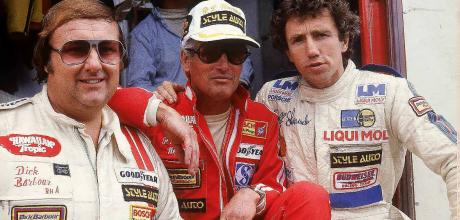Californian hopeful and car dealer Dick Barbour; beside him, of course, is actor Paul Newman
One of the interesting features of Le Mans is that it is one of the few opportunities private teams had to race against works teams. Today, the vast expense and sophistication of racing at this level mean that such teams are professional, but it was not always so. In the 1970s, Group 5 and 6 sports car racing was dominated by turbocharged 911s, the 934 and 935. These off-the-shelf, relatively uncomplicated racing cars offered well-heeled amateurs with $150,000 to spare the chance to compete at the top level – and where better than at Le Mans?
The 1979 edition was a case in point – and the pleased-looking trio in the picture almost pulled off the first victory for a private Porsche team. On the left is Californian hopeful and car dealer Dick Barbour; beside him, of course, is actor Paul Newman (who was also a competitive racer); and right, the mandatory professional driver, Rolf Stommelen. Dick’s 935 had finished third in 1978 (although Brian Redman did most of the driving), and the following year he fielded no fewer than four 935s, including his own entry.
Mist and heavy rain during the night caused high attrition rates. The faster prototypes succumbed, and by daylight the privateer Kremer 935 of the American Whittington brothers Don and Bill was leading, thanks largely to their professional driver Klaus Ludwig, who drove through most of the night. Second came the Dick Barbour 935, where Rolf Stommelen too had the wheel through much of the rain, earning his salary with lap times 25 seconds faster than his two American co-pilots.
Then, as the race ground into its last two hours, the Whittington car lost its 15-lap lead with a faulty fuel pump. Suddenly the Barbour- Newman car was within three laps, but when Rolf took over for the final and possibly winning stint, a cross-threaded centre-lock nut meant a one-minute tyre change turned into an agonising 20 minutes, as the entire hub had to come off. Rolf – who, after 15 years, could see his first win evaporating before his eyes – could barely contain himself. Had the 935 been in better shape, he might still have caught the leader, but on five cylinders and fading fast, it took all his skill to coax it even to second place. No Hollywood ending for Paul Newman, then, but he put a brave face on it. Dick would have another go in 1980 and finish fifth, assisted by Brian Redman and John Fitzgerald, bankrupting himself in the process.
As for the actual winners, people had wondered for years how the Whittingtons financed their racing activities, but in 1986 all became clear, when both brothers were indicted for huge frauds, including narcotics and money laundering. Rolf Stommelen, killed in a GT race crash in 1983, never did win Le Mans, but the irrepressible Paul Newman continued racing in America into his seventies.


